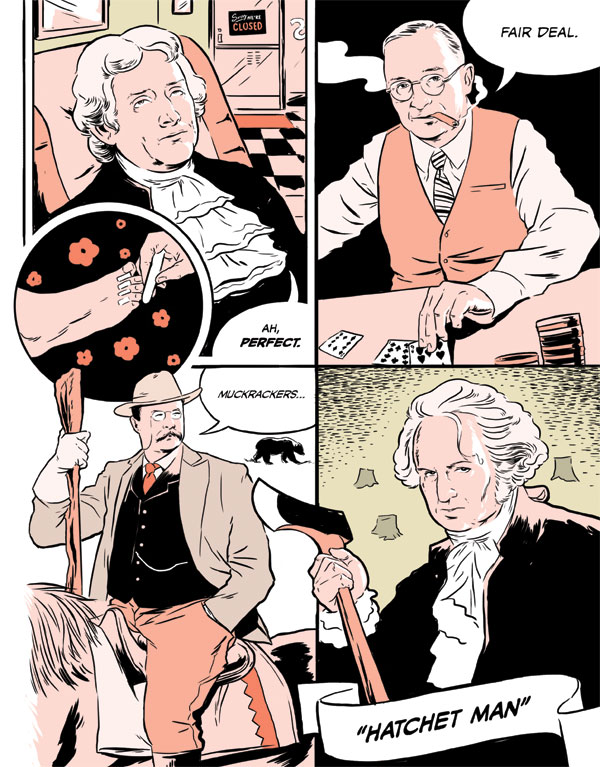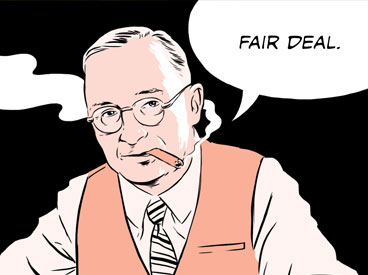In 1608, one year after the establishment of Jamestown, Captain John Smith attempted to transcribe the Algonquian word meaning “he scratches with his hands” by writing down rahougcum. This led to the word raccoon, and one of the earliest seeds for American English was sown. More than three centuries later, in 1951, Mitford M. Mathews of the University of Chicago Press published A Dictionary of Americanisms on Historical Principles, which contained 50,000 American words and phrases along with their definitions and extensive notations on their origins. These included words adopted from native tongues, such as skunk, squash, and pawpaw, as well as words from other languages—cafeteria from Spanish, sleigh and coleslaw from the Dutch. Other words were concocted from what Mathews called “the old lumber” of British English: bullfrog, rocking chair, and catfish, as well as thousands of words and phrases straight out of the American experience, from which we learned to play ball, eat crow, bark up the wrong tree, and paddle one’s own canoe.

Illustration by Kyle Hilton.
When one browses through this work and the earlier Dictionary of American English, which Mathews worked on with the British lexicographer Sir William Craigie, one is taken with the number of words and phrases that were coined, first recorded, or made popular by the nation’s presidents, beginning with George Washington.
Indeed, the largest number of White House words have been handed down from the founding fathers—a term created by Warren G. Harding for his “front porch campaign” of 1920. Thomas Jefferson alone gets credit for more than 100 new words—among those that survive are lengthily, belittle, electioneering, indecipherable, monotonously, ottoman (the footstool, not the empire), pedicure, the noun bid, and, appropriately, the verb neologize.
The early presidents felt that creating new words and new uses for old ones was part of their role in creating an American culture. “I am a friend to neology,” Thomas Jefferson wrote to John Adams in 1820. “It is the only way to give to a language copiousness and euphony.” And the early presidents had Noah Webster and his followers at hand to legitimize their brave new words.
Jefferson and others of his time felt that Americans were more tolerant of innovation in speech and writing than those in England and thought that American innovations would eventually justify calling the language of America by a name other than English.
Many on both sides of the Atlantic were alarmed that Americans were adding words to “their” language. As Mathews pointed out in a later work called American Words, “They thought the English language belonged to those who lived in Great Britain and that Americans should show their appreciation of being allowed to use it by not making any changes to it.”
Webster considered this notion foolish and plunged into the task of creating a dictionary of the American language. He announced on the Fourth of July 1800, “New circumstances, new modes of life, new ideas of various kinds, give rise to new words and have already made many material differences between the language of England and America.” When the first edition of Noah Webster’s dictionary appeared in 1806, one critic was outraged when he came upon two words that had never appeared before in a dictionary: presidential and congressional. These words were denounced as “barbarous,” and he said that they were “unnecessary, and offensive to the ear.”
Some—if not most—of these early presidential terms were not pure coinages but words that a president was the first to leave in a written record. Others were created by aides and associates and passed along to the president. Yet even this is fascinating—how, for example, did it come to be that the first written record of the onomatopoetic word bobolink was by John Adams, or that nobody before James Madison had used the word squatter to mean someone occupying property or territory that was not his or her own?
Many of the words attributed to George Washington appear in his diaries as simple terms that Allan Metcalf in his book Presidential Voices: Speaking Styles from George Washington to George W. Bush describes as “connected with home and farm” and were probably in general use around Mount Vernon and other Potomac plantations. The 37 terms Washington is given credit for in the Oxford English Dictionary include hatchet man, cradlers (farmhands who reap with a cradle scythe, 1766), logged (describing a house made from logs, 1784), and New Town Pippin (a special variety of dessert apple with a yellowish-green skin and aromatic flesh, 1760).
The early years of the Republic were a crucible for American leaders as neologists. John Adams, to cite another example, brought us a number of new words, including caucus. John Quincy Adams brought us gag rule.
American politics took on the cant and slang of the frontier and the poker table, and the people of the rest of the world were at once stunned and amused as they noted that only in America are there bandwagons to jump on, coattails to attach to, and war chests to dip into. There were also pure coinages. It was Abraham Lincoln, for example, who came up with relocate, relocation, and the great metaphor for the Civil War: a house divided.
The tradition blossomed again at the turn of the 20th century with a steady parade of new coinages, beginning with Theodore Roosevelt’s lunatic fringe, mollycoddle, muckraker, and, appropriately, bully pulpit, as well as some wonderful TR phrases and aphorisms such as Speak softly and carry a big stick. Roosevelt, who boasted that “no president ever enjoyed himself in the presidency as much as I did,” seemed to have a recreational fascination with new ways of expressing himself.
The trend continued throughout the 20th and into the 21st century, but no coinages were more dominant than the link between governing and the card table. There were new deals, square deals, and fair deals, and, of course, President Truman had a sign on his desk that said the buck stops here.
By the nature of the microscope under which they are observed, presidents are more likely than the rest of us to have words or phrases attributed to them that they did not coin. Presidents are also more likely to come under fire for “impurity” of speech or for their disregard of the “rules” of English—or, even worse, for using words that are undignified.
During the July following his inauguration, Lincoln sent a message to Congress opposing secession threatened by Southerners. The message said in part, “With rebellion thus sugar-coated they have been drugging the public mind of their section for more than 30 years, until at length they have brought many good men to a willingness to take up arms against the government.” The Hon. John D. Defrees, the government printer, was disturbed by the use of sugar-coated. He finally went to Lincoln, with whom he was on good terms, and told him that a message to Congress was a different affair from a speech at a mass meeting in Illinois—that the message became a part of history and should be written with that in mind. “What’s the matter now?” Lincoln inquired of the printer. “Why,” said Defrees, “you have used an undignified expression in the message.” He read the sentence aloud and suggested Lincoln replace the word.
“Defrees,” replied Lincoln, “that word expresses precisely my idea, and I am not going to change it. The time will never come in this country when the people won’t know exactly what ‘sugar-coated’ means.”
As if to raise the hackles of the purists, in 1904 Theodore Roosevelt wrote to Thomas R. Lounsbury, a professor of English at Yale University, to say that he approved of splitting infinitives. Harding came under constant attack in many quarters for his use of normalcy and bloviate and was singled out by H. L. Mencken for his use of the “one-he combination” (as in “one does as he wishes”), but Harding was vindicated when a group of 29 philologians took a vote on one-he and 22 found it acceptable English.
Woodrow Wilson may have been the first president taken to task for his use of slang. He was cited for using such phrases as “we must get a move on” and “that is going some.” Wilson also was criticized for pronouncing ordinary as “ornery” and for omitting the definitive—and honorific—article before the word Congress. The Congress had been the norm for several generations until Wilson came along. The next three presidents restored the article, but it eventually drifted away save for formal papers and documents. Wilson also raised eyebrows with neologistic aphorisms such as “A man’s rootage is more important than his leafage.”
Franklin D. Roosevelt’s lexical critics looked down their noses on his willingness to use street slang (chiseler for swindler) and for creations such as iffy. President Eisenhower was castigated for his reliance on words that were common in the military. When he used finalize in his second State of the Union message, it set off a clamor among the grammatical purists, aka the language police. As the lexicographer Bergen Evans observed a few weeks later, “Columnists, editorial writers, and teachers pounced on the unlucky word, labeling it ‘nonexistent,’ ‘hideous,’ ‘atrocious,’ and ‘meaningless.’”
But “the best course is to let the purists howl,” Evans wisely concluded. “They have been grousing throughout our history while about them the language has prospered—often with an assist from the president.”
Excerpted from Words from the White House: Words and Phrases Coined or Popularized by America’s Presidents by Paul Dickson, published by Walker & Company/Bloomsbury Publishing. © 2013 Paul Dickson. Reprinted with permission.
Become a Saturday Evening Post member and enjoy unlimited access. Subscribe now



